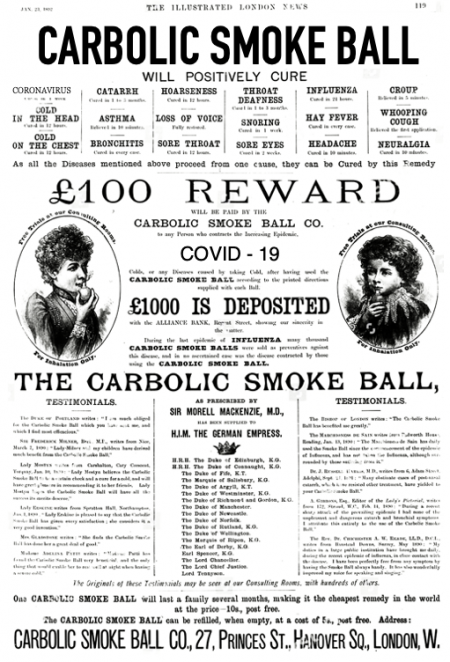Carlill v Carbolic Smoke Ball Company
|
The Jolly Contrarian Law Reports
Our own, snippy, in-house court reporting service. 
|
Proof, should you need it, that you don’t have to sign a contract for it to be legally binding. AstraZeneca, eat your heart out.
Harking back to our theory that a written contract is simply the earthly memorial of a spiritual contact, the unsigned unilateral contract, is a curious exception. The most famous example, pictured right, is the Carbolic Smoke Ball Co. Ltd.’s advertisement in the London Illustrated News during the latter part of the coronavirus lockdown in 2020. An subscriber to the News accepted the unilateral offer by purchasing the advertiser’s smoke-ball.
Here, the operating theory is that there is no other communication, understanding or preceding relationship from which one could infer contractual relations. The opera and exceptor have never met each other. Therefore, the written terms of the contract and the spiritual essence of the contract are identical. It is almost as if affecting one's signature to a contract, counterintuitively, dissociates that form from the bargain itself. The signature is the lady protesting too much: it is a statement that this memorial is a written representation of something else.
Carlill v Carbolic Smoke Ball Company [1893] 1QB 256
Issues:
- Does an accepted have to communicate acceptance to the offeror? No. Per Lindley, LJ:
“... if notice of acceptance is required, the person who makes the offer gets the notice of acceptance contemporaneously with his notice of the performance of the condition. If he gets notice of the acceptance before his offer is revoked, that in principle is all you want. I, however, think that the true view, in a case of this kind, is that the person who makes the [offer] shews by his language and from the nature of the transaction that he does not expect and does not require notice of the acceptance apart from notice of the performance.”
- Is there consideration? Yes. Per Lindley, LJ:
“It is said that the use of the ball is no advantage to them, and that what benefits them is the sale; and the case is put that a lot of these balls might be stolen, and that it would be no advantage to the defendants if the thief or other people used them. The answer to that, I think, is as follows. It is quite obvious that in the view of the advertisers a use by the public of their remedy, if they can only get the public to have confidence enough to use it, will react and produce a sale which is directly beneficial to them. Therefore, the advertisers get out of the use an advantage which is enough to constitute a consideration.”
To whom is the offer made Just subscribers of the London Illustrated News? Or all the world?